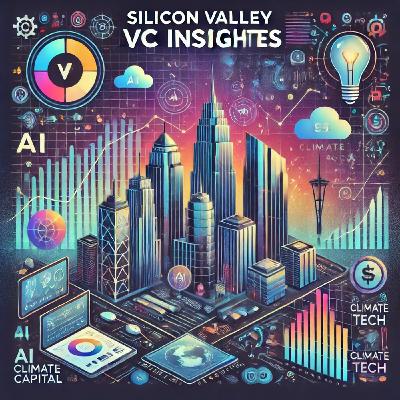Silicon Valley's Tech Titans Defy Economic Woes, Pouring Billions into AI, Climate, and Biotech
Update: 2025-10-04
Description
Silicon Valley venture capital firms continue to defy economic headwinds, channeling billions of dollars into tech, AI, and next-gen sectors even as the broader global economy navigates choppy waters. According to TechStartups, the past week alone witnessed headline-grabbing deals, with Cerebras Systems closing a massive 1.1 billion dollar Series G to expand AI chip manufacturing, and cloud developer favorite Vercel raising 300 million dollars at a 9.3 billion valuation. AI infrastructure and deep tech remain dominant themes. The emergence of Periodic Labs, founded by former OpenAI and DeepMind scientists, exemplifies the trend—this startup just launched with a record-breaking 300 million dollar seed round led by Andreessen Horowitz, NVIDIA, and prominent angels like Jeff Bezos and Eric Schmidt. Their focus on autonomous labs points to the appetite for foundational advances in AI-driven materials discovery.
The flow of capital reflects a “barbell” trend, with mega-firms like Fidelity, Accel, GIC, and Lightspeed doubling down on late-stage, capital-intensive bets in AI infrastructure, cloud platforms, and semiconductor innovation, while early-stage investments remain robust in SaaS, healthtech, and crypto. Even sectors under regulatory scrutiny are seeing innovative plays—according to intelligence360, Alphabet’s CapitalG invested in OMNIA Partners, signaling Silicon Valley’s bid to bring AI-driven disruption to the group purchasing industry and procurement technology.
The latest Silicon Valley Index from Joint Venture reports a total of 69 billion dollars in venture funding for 2025 to date, with climate tech, autonomous vehicles, and health AI drawing outsized attention. Startups like Einride, which focuses on electric self-driving trucks, grabbed 100 million dollars this week from EQT Ventures and IonQ, highlighting the continued green momentum. Open-source platforms are also on the rise: Supabase just hit a 5 billion valuation after a 100 million Series E, showing how developer-centric infrastructure is gaining ground, supported by funds like Accel and Peak XV Partners.
Despite this optimism, top firms are becoming more selective, sometimes demanding stronger roadmaps to profitability, likely in response to persistent inflation and a softening IPO market. Still, the drive for transformational technology in AI and climate solutions is undeterred. Biotech is holding strong, too—Crystalys Therapeutics launched with 205 million dollars for late-stage gout drug trials, showing health innovation is far from sidelined.
Diversity and inclusion remain themes in public statements, though hard statistics on industry-wide progress remain sparse. AI investment is also getting impacted by global regulatory shifts, with European and US venture investors racing to adapt to new guidelines on AI transparency and security. Even as VC-backed employment slipped by 0.1 percent, innovation metrics remain sturdy, underpinned by extraordinary per capita incomes and massive developer demand, according to Joint Venture.
Looking ahead, listeners should expect venture capital to be defined by big infrastructure bets, AI-first startups, and deeper forays into climate tech, with an increased eye on regulatory alignment and social impact. As recession and geopolitical headwinds persist, only the boldest, most tech-centric firms will shape Silicon Valley’s next wave of disruption and diversity.
Thanks for tuning in and don’t forget to subscribe. This has been a quiet please production, for more check out quiet please dot ai.
For more http://www.quietplease.ai
Get the best deals https://amzn.to/3ODvOta
This content was created in partnership and with the help of Artificial Intelligence AI
The flow of capital reflects a “barbell” trend, with mega-firms like Fidelity, Accel, GIC, and Lightspeed doubling down on late-stage, capital-intensive bets in AI infrastructure, cloud platforms, and semiconductor innovation, while early-stage investments remain robust in SaaS, healthtech, and crypto. Even sectors under regulatory scrutiny are seeing innovative plays—according to intelligence360, Alphabet’s CapitalG invested in OMNIA Partners, signaling Silicon Valley’s bid to bring AI-driven disruption to the group purchasing industry and procurement technology.
The latest Silicon Valley Index from Joint Venture reports a total of 69 billion dollars in venture funding for 2025 to date, with climate tech, autonomous vehicles, and health AI drawing outsized attention. Startups like Einride, which focuses on electric self-driving trucks, grabbed 100 million dollars this week from EQT Ventures and IonQ, highlighting the continued green momentum. Open-source platforms are also on the rise: Supabase just hit a 5 billion valuation after a 100 million Series E, showing how developer-centric infrastructure is gaining ground, supported by funds like Accel and Peak XV Partners.
Despite this optimism, top firms are becoming more selective, sometimes demanding stronger roadmaps to profitability, likely in response to persistent inflation and a softening IPO market. Still, the drive for transformational technology in AI and climate solutions is undeterred. Biotech is holding strong, too—Crystalys Therapeutics launched with 205 million dollars for late-stage gout drug trials, showing health innovation is far from sidelined.
Diversity and inclusion remain themes in public statements, though hard statistics on industry-wide progress remain sparse. AI investment is also getting impacted by global regulatory shifts, with European and US venture investors racing to adapt to new guidelines on AI transparency and security. Even as VC-backed employment slipped by 0.1 percent, innovation metrics remain sturdy, underpinned by extraordinary per capita incomes and massive developer demand, according to Joint Venture.
Looking ahead, listeners should expect venture capital to be defined by big infrastructure bets, AI-first startups, and deeper forays into climate tech, with an increased eye on regulatory alignment and social impact. As recession and geopolitical headwinds persist, only the boldest, most tech-centric firms will shape Silicon Valley’s next wave of disruption and diversity.
Thanks for tuning in and don’t forget to subscribe. This has been a quiet please production, for more check out quiet please dot ai.
For more http://www.quietplease.ai
Get the best deals https://amzn.to/3ODvOta
This content was created in partnership and with the help of Artificial Intelligence AI
Comments
In Channel





